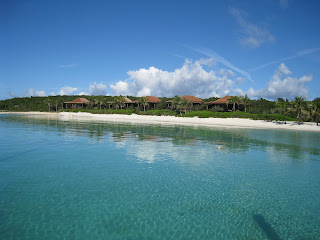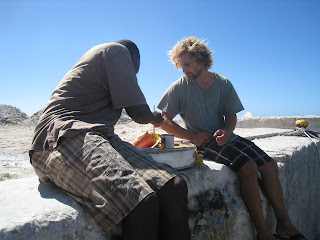“Yo, dudes!” Max shouted from the cockpit, his voice dragging with sleep yet sharp with alarm. Earlier, we had tucked into a cozy anchorage in White Sound, Elbow Cay. Finding a place to anchor with room to swing was tricky, even with the sun overhead. We bounced from one sandbar to another trying different places, one of us jumping in the water to push the keel off the sandbar at each location.
Now midnight and almost a new moon, the clouds made the night darker. A low-pressure system was passing to the north of the cay, bringing cold, high winds, and intermittent rain.
“Hey fellas! Wake up!” Max tried again.
“Yo!” Christian barked back.
“Mmmmmph!” JB groaned.
After a pause, Max explained, “Our anchor dragged and we’re beached.”
“A’right.”
“Mmmmmph!”
We all put on our bathing suits and jackets, mentally preparing ourselves.
“What’s the situation?” Christian had come out of the cabin, wearing a speedo and raincoat.
Max was dismal, looking things over. “The wind’s really picked up. The Bruce [our anchor] dragged and we’re lying on a fucking sandbar. We have one hour until the first high tide, then the tide’s going out until five a.m.” The tidal change was about three feet. We had anchored in about 7 feet expecting the boat’s full keel to sit gently on the bottom when the tide went out, The Seeker drafting just 4 ½ feet. After discussing what direction to push the boat, we set about to push back toward the channel no more than 25 yards away. We walked around the boat, feeling for the bottom type and depth. In the darkness we worked in the water, pushing, pulling, rocking the boat, straining, grunting, running the engine in forward and reverse, jumping in and out of the boat to push or steer. At some point we switched to wetsuits with jackets. As the tide went out and the wind continued to blow, the boat became only more stuck. For two hours we inched the boat toward the channel. We connected several ropes, running a line from the top of the mast to an anchor on the opposite side of the channel. Using the dinghy, the anchor was set off the beam (the imaginary line at the widest part of the vessel, perpendicular to the centerline), as far away as possible to keep the angle of the anchor line as low as possible. By winching-in the anchor line, we pulled the boat onto its side, decreasing its draft. The trick might have worked with less wind or on an incoming tide. But the wind gusting up to 25 knots pushed us only further onto the sand. Cold, wet, and exhausted, we made hot chocolate and PB & J’s then climbed into our beds. Christian lay down to sleep but gravity quickly intervened, tossing him onto the floor due to our tremendous angle of heel. For an hour, JB and Max slept on the walls next to their beds, which were more horizontal. At six a.m. we were lying on our side in just over one foot of water.
“Ugh! I slept like crap.”
“Me too, man.”
“Ha! At least you guys got an hour. I didn’t sleep at all.” Christian said from outside. He had already has his instant coffee. As JB and Max rubbed the sleep from their eyes, they heard a splash.
“Damnit! Are you kidding me?! Damnit!” Outside Christian was pulling himself back into the boat, fully clothed and soaking wet. He had been standing on the toerail making preparations for our next attempt to move the boat when he lost his balance. In shoes, socks, sweatpants, two shirts, two jackets, and a hat, which is quite literally half his closet, he fell directly backwards off the high side of the boat into one foot of water on top of one foot of mud. If the fall wasn’t so ridiculous, Christian might’ve been angry. We all chuckled wearily at the comic relief Christian’s fall provided, and ultimately at our predicament. As we drank coffee, we discussed how best to utilize the next high tide at eleven a.m. We proposed many options, weighing their merits and disadvantages. We tested anchors set in different places such as on the beach and in the middle of the channel. Ultimately, the general tactic stayed the same as before: use lines from the masthead to create heel, artificially lowering our draft. Christian and JB secured a line to shore while Max set one aft to keep us from beaching ourselves further when the tide came in. A third line went from the nearest channel piling through a pulley to a winch to add tension in the direction of the channel. The opposing forces of the anchors would keep us from moving further onto the bar while maintaining our angle of heel. With the boat set up, we waited for the tide to come in.
At high tide, we put our plan into action. “One, two, three!” Again pushing and pulling on the hull in the water, we ran the engine alternatively in full forward and reverse. Little happened. The boat rotated some but it was clear that we would still need another six inches of depth to float freely. The tide would not be that high for another four days. We were totally stuck. Several boats had passed in the morning while we struggled. Somewhat downtrodden, we gathered on the deck to formulate a new plan. Finally, one boat stopped and offered to help. The man at the helm, Captain James, put himself and his boat at great risk to help us. He used his four-hundred horsepower, twenty-eight foot center console to muscle our heavy boat across the shallow area and back into the channel.
At the dock of the nearby Seaspray Marina, we thanked Captain James and asked how we could repay him, offering food, money, and reimbursement for the gas he used. He told us:
“Look ‘ere, young man. I am a man of Ga’, you see. Lemme tell you boys a story. Day before yesterday a man tried to steal my boat. He use a screwdriver and break m’ ignition. So I take de boat to da mechanic. I go to pay ‘im for fixin’ an’ he tell me, ‘Someone else did wrong tryin’ to take ya’ boat, I’m not gonna charge you to fix dat. You just pass on de good, you know?’ So now I pass it on to you. And you pass it on to the next when you can, you see. You have a bible on de boat, good buddy?”
“Yeah we have a Bible, Koran, and Bhagavad-Gita, actually.”
“Good! Ya put ya trust in Ga’, an’ he will provide. So like the mechanic ‘elp me, I ‘elp you and you to someone.”
We had lunch with him at the marina, where the subject of conch came up. He suggested we ought to gather conch and lobster to have a traditional dinner with his family in a few days. We agreed. After we recovered and thanked our new friend, we chose to return to the same place where we had dragged anchor, this time picking up an unused mooring. We pulled into the spot carefully, so as not to run aground. Christian dislocated his shoulder while securing the mooring line but was successful nonetheless. The next morning we met the owner of the mooring, who turned out to be Steve Dodge, author of the Cruising Guide to the Abacos. He gave us permission to stay on his mooring and told that no one else anchors in White Sound because the silt hides flat rock underneath, across which anchors slide (while appearing to be dug-in). For the next three weeks The Seeker was safe on our own private mooring, next to the best surf spots in the Bahamas but more importantly in just the right place to make friends.






























